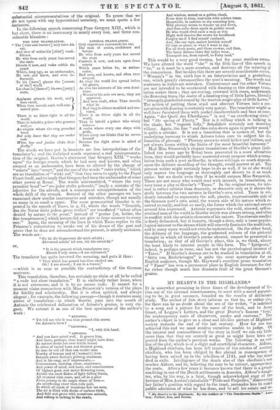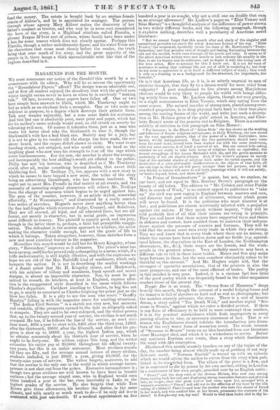MY HEART'S IN THE HIGHLANDS.*
IT is somewhat promising in these times of the development of fic- tion out of the internal consciousness, to meet with a novel purport- ing to be, in great measure, founded on the results of deliberate study. The author of this story informs us that he, or rather chic, for there can be no doubt about the sex of the writer, "is indebted to a song and a picture for the name of the book, and to Anne Grant, of Loggan's Letters, and the great Doctor's famous tour,' for contemporary casts of characters, modes and customs." The author's object is to give us a close and life-like picture of Highland society towards the end of the last century. How fur she has achieved this end we must confess ourselves unable to judge. Of the interest and vraisemblance of the story in itself we can say little more than that they are scarcely as great as might have been ex- pected from the author's previous works. The followin,g is an out- line of the plot, which is of a slight and unartificial character. Aldour, a Highland chieftain, has been left trustee of the estates of another chieftain, who has been obliged to flee abroad in consequence of having been mixed up in the rebellion of 1715, and who has since died in exile. Intelligence of the death also of this chieftain's son reaches Aldour, and he, believing the race to be extinct, appropriates the rents. After a few years it becomes known that there is a grand- son living in one of the Dutch settlements in America. Aldour's daugh- ter, who, by the way, is a faint, though acknowledged copy of the heroine of Miss Austen's inimitable "Pride and Prejudice," discovering her father's position with regard to the trust, persuades him to make public admission of what he has done, and to sell his estate and re: * My Mewl's in the Highlands. By the Author of "The wasinsosaosabas." Loa- don: Parker, Son, and Bourn. fund the money. The estate is bought back by an orphan female cousin of Aldour's, and he is appointed its manager. The person through whose agency Mary ildour makes the discovery of her father's conduct as trustee, and who may be in some sort considered the hero of the story, is a Highland chieftain called Emilia, a gloomy Fergus M`Ivor sort of person, whose family have been under a ban for some reason which does not clearly appear. Perhaps this Finralia, though a rather melodramatic figure, and his sister Ussie are the characters that come most clearly before the reader, the truth being that over much of the story, and the great majority of the people in it, there hangs a thick uncomfortable mist like that of the regions described in it.































 Previous page
Previous page